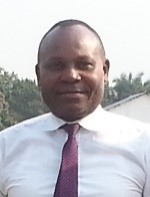Expert Experience

ASLM recently sat down with Dr Muwonga Jérémie Masidi, LabCoP Team Lead for the Democratic Republic of the Congo, to discuss their initiative to evaluate rapid diagnostic tests (RDT) and diagnostic algorithms for HIV infection.
ASLM: Dr Masidi, you were part of the Democratic Republic of the Congo team that recently completed Phase 2 of an evaluation of RDTs and diagnostic algorithms for HIV infection. Can you explain what the impetus was for the launch of the initiative?
Dr Masidi: The World Health Organization (WHO) has issued standards and guidelines to ensure the reliability of diagnostic test results, including the use of a three-test algorithm to confirm positive results. Also, the tests used in the algorithm in a country must have been evaluated under local conditions and must be periodically evaluated thereafter. In the Democratic Republic of the Congo, the last evaluation was carried out in 2015, after which one of the tests in the algorithm in use stopped being manufactured. Hence, a new evaluation was needed to update the algorithm.
ASLM: What were the goals in Phase 1, and how did Phase 2 differ?
Dr Masidi: The goal of Phase 1 was to determine the performance of the tests, including the sensitivity, specificity, and negative and positive predictive values, and to detect possible cross-reactivities between the different tests that can be retained in the algorithm. This was done by experienced technicians in the laboratory using a well-qualified panel. In Phase 2, we verified the practicability and possible challenges of implementing the selected algorithm in the field, with a view to readjusting or developing guidelines to facilitate the work of providers in the field.
ASLM: Is the evaluation being applied to other diagnostics beyond HIV-related RDTs? Can you tell us more?
Dr Masidi: Yes, the assessment is also being applied to tests other than those for the diagnosis of HIV. Indeed, tests such as those used in malaria diagnosis are being evaluated for the same reasons that I mentioned above.
ASLM: Why is this initiative so vital?
Dr Masidi: This work is vital because it makes it possible to guarantee the reliability of test results by minimising possible errors and false results that may be related to the low performance of the tests, the algorithm, or the challenges encountered by the providers in conducting the tests. Such errors have harmful consequences for people, the community, the health system in general, and the laboratory system in particular.
ASLM: What were some of the challenges encountered in conducting this evaluation and what would be your advice for countries that would like to conduct a similar evaluation?
Dr Masidi: This work is not routine and had to be done in a limited time. It was necessary to choose sites with a large volume of work, thus constituting an overload of work for the system and the service providers. This required training the staff, informing and sensitising care providers and decision-makers at different levels about the merits of the work, and mobilising all the necessary resources to carry out the work in the field.
ASLM: How has LabCoP been a helpful partner in this work?
Dr Masidi: LabCoP has assisted us technically with advice and shared experiences from colleagues in other countries, as well as in the mobilisation of certain partners who financially supported the activity, especially Global Health System Solutions (GHSS). Despite COVID-19-related challenges, LabCoP, the United States Centers for Disease Control and Prevention, and the WHO provided us with a list of WHO-prequalified tests that could be obtained over time. They helped us correct the SOPs for the tests, analyse the laboratory data, and classify the tests to be retained in the algorithm according to their performance and characteristics (principle, antigenic preparations, etc.).
ASLM: What are the next priorities of the Democratic Republic of the Congo LabCoP team to further strengthen laboratory systems for HIV-related testing and the diagnostics of priority diseases in general?
Dr Masidi: Together with the actors of the Democratic Republic of the Congo health system, we have to implement and popularise the final algorithm throughout the country and implement the third phase of the evaluation, which involves the continuous monitoring of the performance of the tests and the algorithm. The experience gained will be used to improve the diagnosis of other diseases, including COVID-19, malaria, tuberculosis, and any others that may prove feasible.
—————————————————-
ASLM appreciates Dr Masidi’s time and contributions to the LabCoP community. For more information about the process of verifying HIV tests, see the World Health Organization’s Toolkit to Optimize HIV Testing Algorithms here.
